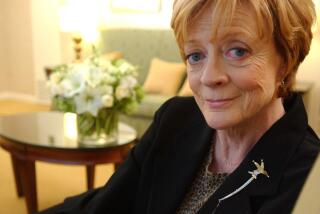From the Archives: The Times’ original review of ‘Downton Abbey’ found ‘plenty of sex and secrets, romance and treachery to go ‘round’
- Share via
The final episode of “Downton Abbey” airs Sunday (March 6), bringing six seasons of life (and death) with the Crawleys and their staff to a close. The Masterpiece Classic series premiered in 2011 and follows an aristocratic British family and its servants in a drama set in the early 20th century. Here’s what we thought of the show when it premiered:
Although the new year is just days old, we have a winner in the 2011 Worst Timing in Television Award: KCET, which dumped PBS mere months before Masterpiece Classic launched possibly the best show of the year. “Downton Abbey,” which premieres Sunday, is this generation’s “Upstairs, Downstairs,” both in theme — the daily dramas of a titled British family and their many servants — and in stature. So popular in the U.K. that “Vanity Fair’s” Graydon Carter felt obligated to mention a local run on velvet jackets in a recent editor’s note, “Downton Abbey” is all that “Upstairs, Downstairs” was, and more.
“More” being things as simple as production values (Downton Abbey is a glorious country estate of which the camera takes full and gorgeous advantage) and star power (it’s difficult to beat Maggie Smith as a dowager anything) and as tricky as subtext and foreshadowing. Writer Julian Fellowes takes the universal themes of love, betrayal, domestic politics and the vagaries of power that he used so effectively in “Gosford Park” and hangs them on a crumbling precipice of change. As with “ Mad Men,” the characters in “Downton Abbey” face the tail-end of an era; women’s suffrage, the rise of socialism, and the imperturbable march of technology all threaten to upend the system of class and manners that protected and calcified Downton and its inhabitants for years.
But don’t worry, there’s plenty of sex and secrets, romance and treachery to go ‘round, not to mention the “that will be all, O’Brien” and “yes, mum” dialogue that masks the so often wretched and lonely hearts of British aristocrats. Like “The King’s Speech,” which depicts another family on a similar brink, “Downton Abbey” makes it clear that those who exist in the higher realms of the food chain could not survive a day without the proletariat, but it also acknowledges, albeit wistfully, that in many cases the benefits were mutual.
It helps that the lord of the manor, the Earl of Grantham (Hugh Bonneville), is so modern he not only sleeps in the same bed as his wife, Cora (Elizabeth McGovern), he also, upon hearing the news of the Titanic’s fate, mourns first the fate of the poor people in steerage. But soon he realizes he has more immediate cause for mourning. Grantham’s estate is entailed to pass over the heads of Grantham’s three daughters, Mary, Edith and Sybil, to a male heir, who, along with the heir’s son, was aboard the Titanic.
While the two men who drowned were known to the family, the son conveniently engaged to Lady Mary (Michelle Dockery), the next in legal line is distant cousin Matthew Crawley (Dan Stevens), a middle-class lawyer. Over the gentle pleadings of Cora, an American whose fortune saved Downton and is now part of the estate, or the less gentle insistence of his mother (Smith), Grantham refuses to fight the entail. Instead he invites Matthew and his mother (Penelope Wilton) to come live on the estate, to learn his duties and, perhaps, for an attachment to Lady Mary.
But Crawley is dismissive of his newfound fortune, and Lady Mary won’t suffer a commoner at any price. So the battle of old and new England begins, with moments of high hilarity — “what on Earth is a ‘week-end?’” the countess asks (as only Maggie Smith can) when Crawley suggests that he will practice law during the week and see to Downton on the weekend — and pathos.
Below the stairs, similar tensions roil — the Earl has hired a new valet named Bates (Brendan Coyle), passing over the ambitious and conniving footman Thomas (Rob James-Collier). Bates has a marked limp, which, when exacerbated by Thomas and his equally bitter protector, the lady’s maid O’Brien (Siobhan Finneran), upsets the well-oiled machine overseen by butler Carson (Jim Carter). The cast is simply stunning, with each actor creating a character both emblematic and utterly human. As Bates, Coyle’s performance is something to behold — never has manly anguish been so silently and effectively portrayed — and Finneran’s O’Brien is an excruciating balance of devoted love and rebellious hatred. Wilton’s Mrs. Crawley more than holds her own with Smith’s countess while sisters Mary and Edith (Laura Carmichael) circle each other in sisterly spite, leaving Sybil (Jessica Brown-Findlay) to quietly embrace the new England simply because no one is watching.
The American fascination with the British aristocracy can seem troubling — this is the land and the system we rejected for a variety of very good reasons — why do we love it so? But over the years, this certain set of people have become almost creatures of fantasy, tantalizing us with an almost fairy-tale air of beauty, glamour and ancient if perilous tradition. In America, money, and sometimes fame, equals power and prestige; in turn-of-the-century England, money was often as big a worry to the powerful elite as it was to the commoner and both were limited in their ability to earn it. So which is the more egalitarian society in the end?
More to Read
The complete guide to home viewing
Get Screen Gab for everything about the TV shows and streaming movies everyone’s talking about.
You may occasionally receive promotional content from the Los Angeles Times.







